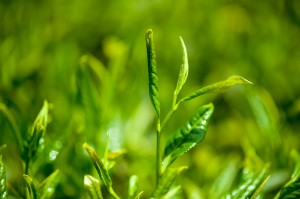What do you know about tea extract – tea polyphenols?Tea extract is a plant cosmetic raw material with

a variety of skin care effects. It is a safe, widely sourced and potential cosmetic additive. The main functions in cosmetics and daily chemical products are moisturizing, anti-oxidation, whitening, anti-aging, anti sterilization and freckle removal.
What are the main components of Tea Extract?
The main functional component of tea extract is tea polyphenols, also known as tea tannin and tea kneading quality. It is a kind of Polyhydroxy Phenol compound existing in tea. In addition to tea polyphenols, tea extracts also include catechins, chlorophyll, caffeine, amino acids, vitamins and other nutrients.
What are Tea Polyphenols? What are its Effectiveness and Functions?
Tea polyphenols (also known as kangaoling, vitamin polyphenols) is the general name of polyphenols in tea. It is the main component of green tea, accounting for about 30% of dry matter. It is known as the “radiation Nemesis” by health and medical circles. Its main components are flavanones, anthocyanins, flavonols, anthocyanins, phenolic acids and phenolic acids. Among them, flavanones (mainly catechins) are the most important, accounting for 60% – 80% of the total amount of tea polyphenols.
Effectiveness and Benefits
Tea polyphenols have antioxidant and free radical scavenging effects, significantly reduce the contents of serum total cholesterol, triglyceride and low-density lipoprotein cholesterol in hyperlipidemia, and restore and protect the function of vascular endothelium. The hypolipidemic effect of tea polyphenols is also one of the main reasons why tea can make obese people lose weight without rebound.
Health Care Function
Hypolipidemic effect:
Tea polyphenols can significantly reduce the contents of serum total cholesterol, triglyceride and low-density lipoprotein cholesterol in hyperlipidemia, and restore and protect the function of vascular endothelium. The hypolipidemic effect of tea polyphenols is also one of the main reasons why tea can make obese people lose weight without rebound.
Antioxidant effect:
Tea polyphenols can block the process of lipid peroxidation and improve the activity of enzymes in the human body, so as to have the effect of anti mutation and anti-cancer.
Antitumor effect:
Tea polyphenols can inhibit the synthesis of DNA in tumor cells and induce mutant DNA breakage, so it can inhibit the synthesis rate of tumor cells and further inhibit the growth and proliferation of tumors.
Sterilization and Detoxification:
Tea polyphenols can kill botulinum and spores and inhibit the activity of bacterial exotoxin. It has antibacterial effects on various pathogens causing diarrhea, respiratory tract and skin infection. Tea polyphenols have obvious inhibitory effects on Staphylococcus aureus and Bacillus mutans causing suppurative infection, burn and trauma.
Anti alcohol and liver protection:
alcoholic liver injury is mainly free radical injury caused by ethanol. Tea polyphenols, as a free radical scavenger, can inhibit alcoholic liver injury.
Detoxification:
serious environmental pollution has obvious toxic effects on human health. Tea polyphenols have strong adsorption on heavy metals and can form complexes with heavy metals to produce precipitation, which is conducive to reducing the toxic effect of heavy metals on the human body. In addition, tea polyphenols can also improve liver function and diuresis, so it has a good antidote effect on alkaloid poisoning.
Other applications
As an excellent additive for cosmetics and daily chemicals: it has strong antibacterial and enzyme inhibition. Therefore, it can prevent skin diseases, skin allergic effects, remove skin pigment, prevent dental caries, dental plaque, periodontitis and halitosis.
Safety of Tea Extract
1. According to the human safety and efficacy evaluation test method of hygienic standards for cosmetics (2007 Edition), the safety test of tea polyphenols extracted from tea was carried out. The test results showed that the subjects did not have adverse skin reactions, and none of the 30 people showed positive. It shows that the cosmetics added with tea polyphenols have no irritating reaction to the human body, are safe and can be used as cosmetic additives.
2. The announcement on the catalogue of used cosmetic raw materials issued by the State Food and Drug Administration in 2014 included tea extract Tea polyphenols and catechins are used as cosmetic raw materials.
3. The US Food and Drug Administration (FDA) lists tea extract as Gras (generally considered safe).
4. When the United States Pharmacopoeia stipulates that tea extract is used as an additive in an appropriate dose range, there is no report of its unsafe use.
Post time: Apr-27-2022